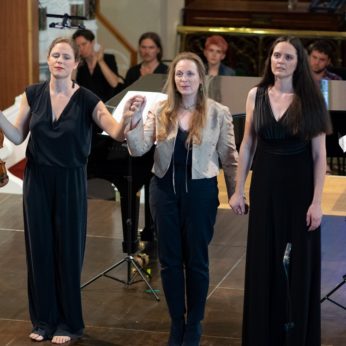Composer: Deirdre Gribbin (b. 1967)
Performance date: 03/07/2018
Venue: St. Brendan’s Church
Composition Year: 1918
Duration: 00:38:21
Recording Engineer: Ciaran Cullen, RTÉ
Instrumentation: T-solo, pf
Instrumentation Category:Duo
Artists:
Nurit Stark -
[violin]
Caroline Melzer -
[soprano]

Caroline Melzer [soprano], Nurit Stark [violin]
Deirdre Gribbin [born 1967]
Kindersang [1918] WORLD PREMIERE
1. East Wind
2. Ice-Break
3. The Non-Emigrant
4. A New Subject
5. Attic
6. First Channel Crossing
7. Arrival
8. The Red Cross Telegram
9. Deportation
10. Kol Nidrei
11. Suitcase
The work is performed without a break
On November 10th 1938 Hitler’s Kristallnacht pogrom prompted the Refugee Children Movement that rescued 10,000 unaccompanied Jewish children from occupied Europe on Kindertransport trains to the UK and Northern Ireland during a nine-month period. Children travelled alone with nothing but a nametag and sealed suitcase. The majority of them never saw their parents again. In this 80th anniversary year I have marked this historical event by setting poems by survivor Lotte Kramer in a new song cycle for soprano Caroline Mezler and violinist Nurit Stark.
Kramer was fifteen when she came from Germany on one of the last Kindertransport trains. Lotte found herself living in the amazing home of the eccentric Irishwoman Margaret Fyleman who was married to a retired Indian colonel. Margaret had studied singing in Berlin before 1914 and had fond memories of Jewish hospitality there. One of her daughters was an actress who frequently brought home cosmopolitan refugees and artists who entertained with renditions of Shakespeare, Dickens and Schubert. The young Lotte was divided between a fascination for this new bohemian world and a great homesickness and longing for her parents. Her final communications with them were restricted to five word Red Cross messages.
Kramer’s poems written directly about the period around Kristallnacht are poignant memories from childhood. The words evoke that real sense of fear felt around events that were unfolding in Germany. The poems are also full of simple family images of great intimacy with her parents. In Kindersang I have traced a narrative through eleven poems from Mainz to her arrival in England. Her latter poems are full of hope and joy but I was also struck by the underlying tinge of sadness connected to her past, which seems always to be present in her writing where every day moments like closing the door of her house reminds her of her mother doing the same when they parted. The characters she shares evoke a humanity and vulnerability through their stories and this gives such depth to her writing. Lotte still lives in Cambridgeshire and is 95 years old.
Kindersang starts through the eyes of the child with both mother and father in fragile moments of tenderness shared between soprano and violin. The following songs jolt this innocence into the horrible reality, which prompted an escape to a new life. Memory frames the narrative. The world shared is new and fresh but holds such reverence to the roots of the past.
My connection to the Kindertransport survival stories is deeply personal. My husband is Jewish. I often think about would have happened to my son Ethan, who has Down Syndrome, had he lived in German occupied Europe. Had he been lucky enough to survive how would he have processed family separation if he was one of the Kindertransport children?
At a time when freedom of thought, belief and movement is being challenged in Europe and the wider world in relation to border crossing, immigration and human rights, KinderSang and its historical resonances seeks to remind us that the courage and perseverance of committed individuals can overcome the reluctance of authorities to address the suffering of refugees.
This work is dedicated to Francis Humphrys whose commitment to, and love of chamber music is an inspiration.
Deirdre Gribbin 2018
Copyright © 2025 West Cork Music. All rights reserved.
Designed and developed by Matrix Internet